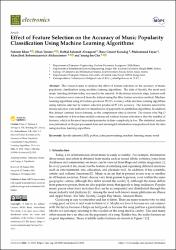Effect of Feature Selection on the Accuracy of Music Popularity Classification Using Machine Learning Algorithms
Citation
Khan, F.; Tarimer, I.; Alwageed, H.S.; Karada ̆g, B.C.; Fayaz, M.; Abdusalomov, A.B.; Cho, Y.-I. Effect of Feature Selection on the Accuracy of Music Popularity Classification Using Machine Learning Algorithms. Electronics 2022, 11, 3518. https://doi.org/10.3390/electronics11213518Abstract
This research aims to analyze the effect of feature selection on the accuracy of music popularity classification using machine learning algorithms. The data of Spotify, the most used music listening platform today, was used in the research. In the feature selection stage, features with low correlation were removed from the dataset using the filter feature selection method. Machine learning algorithms using all features produced 95.15% accuracy, while machine learning algorithms using features selected by feature selection produced 95.14% accuracy. The features selected by feature selection were sufficient for classification of popularity in established algorithms. In addition, this dataset contains fewer features, so the computation time is shorter. The reason why Big O time complexity is lower than models constructed without feature selection is that the number of features, which is the most important parameter in time complexity, is low. The statistical analysis was performed on the pre-processed data and meaningful information was produced from the data using machine learning algorithms.


















